|
|
Prof. Dr. Bharat B. AGGARWAL
Targeting inflammatory pathways linked to chronic diseases by nutraceuticals designed by Mother Nature
Inflammation Research Institute (USA)
 |
|
Dr. Aggarwal is currently a Founding Director of an Inflammation Research Center in San Diego, California. He is also currently serving on the Advisory Board of Oncocure, Herbal Life, Victorian Epicure and Aveta Biomics. Until December 31st, 2015, Dr. Aggarwal was a Ransom Horne Distinguished Professor of Experimental Therapeutics, Cancer Research, Cancer Medicine, Biochemistry and Immunology and Chief, Cytokine Research Section, in the Department of Experimental Therapeutics at the University of Texas M. D. Anderson Cancer Center, Houston, Texas. He also served as member of the University of Texas Graduate School of Biomedical Sciences, Houston, and as an Adjunct Professor at Albert B. Alkek Institute of Biosciences and Technology, Texas A&M University, Houston, Texas.
Dr. Aggarwal earned his Ph. D. in Biochemistry from the University of California, Berkeley, received his Post-Doctoral training from the Hormone Research Laboratory at the University of California Medical Center, San Francisco. He then started his career with Genentech Inc where he worked for almost ten years and his work lead to the discovery of TNF-a and TNF-b, an essential component of the immune system; and identification of their receptors.
In 1989, Dr. Aggarwal was recruited as a Professor of Medicine and of Clinical Immunology & Biological Therapy, Chief of the Cytokine Research section at the University of Texas M. D. Anderson Cancer Center. Since then Dr Aggarwal has been investigating the “Role of inflammatory pathways mediated through TNF, NF-kappaB, STAT3, and CXCR4 for the prevention and therapy of cancer, osteoporosis and other chronic diseases”. While searching for novel and safe anti-inflammatory agents, his group identified more than 50 novel compounds from mother nature incluing spices, dietary agents and from Traditional Medicine that interrupt these cell-signaling pathways. These agents have been tested in various animal models and some of them in Clinical Trials. He has published almost 700 papers in peer-reviewed international journals (including Science, Nature, Cancer Cell, PNAS, Journal of Experimental Medicine, Blood, JBC, Cancer Research, Journal of Immunology), invited reviews and book chapters.
Dr. Aggarwal is inventor/co-inventor on over 33 patents. He has been listed as one of the most highly cited scientist in the world by ISI since 2001; and has been included in ISI Highly Cited among most highly cited authors in Immunology category. His publications exhibit high-citation index with over ten exceed 1000. His overall citation is now at 89 712 with an H-index of 157. Dr. Aggarwal has been listed among top 100 most highly influential biomedical researchers in the world.
Dr. Aggarwal is currently a member of the editorial boards of 24 international journals and served as a reviewer for more than 160 journals, various grant proposals and of several Ph.D. theses.
Dr. Aggarwal has edited 15 books and served as Guest editor for special issues from Biotherapy, Cancer Letters and Current Opinion in Pharmacology, Immunopathologic Diseases and Therapeutics, and Molecules (open access). He has trained over 80 Post-doctoral Fellows and Visiting Professors from around the world. He has co-organized and served as member in many International and National Conferences/ Symposia; has started International Society of Translational Cancer Research and has delivered over 400 lectures/seminars/keynote talks in more than 50 countries.
He has recently authored a book “Healing Spices” released in January, 2011 by Sterling; and is already a best-seller.
Dr. Aggarwal has received numerous awards including ARTOI Award, Association for Research Integrated Oncology Therapies, Rome, Italy, 2012; 2011 James A. Duke Award Excellence in Botanical Literature Award, American Botanical Council, Anaheim, California, 2012; World Congress Science Prize from Oxygen Club of California 2010; Excellence in Research Award of McCormick Research Institute from the American Association of Nutrition, 2008, Outstanding Scientist Award from the American Association of Indian Scientists in Cancer Research, 2006, Ranbaxy Award for Outstanding Scientist of the year, 2004.
|
|
Prof. Dr. Atanas ATANASOV
Natural products to modulate macrophage phenotype in the context of atherosclerosis
Polish Academy of Sciences (Poland)
University of Vienna (Austria)
 |
|
Prof. Atanas Atanasov is a head of the Molecular Biology Department at IGAB, Polish Academy of Sciences (Poland). His research interests cover Molecular medicine, Nutrigenomics, and Bioactive molecules. In these research areas, Prof. Atanasov has published 70+ scientific papers.
Prof. Atanasov studied Biotechnology at University of Sofia (Bulgaria) and later did his PhD in Biochemistry at the University of Bern (Switzerland), and accomplished his Habilitation in Pharmacognosy - Pharmaceutical Biology at the Department of Pharmacognosy of the University of Vienna (Austria). At the Department of Pharmacognosy, he was actively involved in the execution of the Austrian national network “Drugs From Nature Targeting Inflammation (DNTI)”, a collaborative research project which has been financed with >3 000 000 Euro from the Austrian Science Fund (FWF) to support the identification and characterization of plant-derived natural products counteracting inflammatory responses.
Prof. Atanasov has also been appointed as a beneficiary member and actively contributed to the European Commission 7th Framework Program (FP7) network consortium “Good Practice in Traditional Chinese Medicine (GP-TCM)”. In recognition of his overall achievements, Prof. Atanasov has been awarded in 2012 with a “Focus of Excellence” distinction by the Faculty of Life Sciences, University of Vienna.
RESEARCHGATE: http://www.researchgate.net/profile/Atanas_Atanasov
SOCIAL MEDIA: http://about.me/Atanas_At
|
|
Prof. Dr. Vassya BANKOVA
From plants to pharmacy shelf via the beehive
President of the Bulgarian Phytochemical Society
Institute of Organic Chemistry with Centre of Phytochemistry (Bulgaria)
.jpg) |
|
Vassya Bankova obtained her PhD in Natural Product Chemistry at the Bulgarian Academy of Sciences (Sofia). She has worked as a guest-researcher at the Ruhr University (Bochum), the University of Saarland (Saarbruecken), the Bandeirante University (Sao Paulo), and the Institute of Molecules of Biological Interest (Naples). In 2004 she became full professor at the Institute of Organic Chemistry with Centre of Phytochemistry, where she is now heading the lab of “Chemistry of Natural Substances”.
Her research interests are directed towards the search for new bioactive compounds from unexplored biological subjects (i.e., endemic plants, mushrooms, bee products, just to name a few), development of modern reliable methods of qualitative and quantitative analysis of the active components in complex extracts of natural products. Her special interest is devoted to the bee product propolis (bee glue): its chemistry, plant origin, biological activity, health-promoting potential, analysis and standardization. She and her group have been studying propolis for over 20 years, hence have made major contributions to the current knowledge of propolis and have published over 90 papers in international peer reviewed journals and four book chapters on this topic. Her total number of publications is over 180, with an H-index of 38.
Prof. Bankova is a member of the International Honey Commission and president of the Bulgarian Phytochemical Society. She is also a part-time lecturer at the University of Sofia and is on the Editorial Board of Chemistry Central Journal as Section Editor for Organic Chemistry Section and of the Editorial Advisory Board of Natural Product Communications. In 2015 she was elected to a corresponding member of the Bulgarian Academy of Sciences.
|
|
Prof. Dr. Francesca BORRELLI
Evidence-based phytotherapy in erectile dysfunction
University of Naples Federico II (Italy)
 |
|
Francesca Borrelli was born in Naples (Italy), in 1970.
Education: Degree in Pharmacy in 1994; Specialization in Science and Technique of Officinal Plants in 1997; PhD in Pharmaceutical Sciences in 2001.
Current position: Associate professor at the Department of Pharmacy, University of Naples Federico II.
Foreign experience: Visiting PhD student (1998-2000) at Department of Surgery, Guy's, King's and St Thomas Schools of Medicine and Dentistry (London, UK); post-doctoral fellow (2004) at Institute of Experimental and Clinical Pharmacology and Toxicology, Medical University of Lubeck (Lubeck, Germany); post-doctoral fellow (2001, 2003 and 2006) at Department of Complementary Medicine, School of Postgraduate Medicine and Health Sciences, University of Exeter (Exeter, UK).
Main focus of the research activity: Her research work is focused on the therapeutic relevance of plant-derived compounds in the field of the gastrointestinal pathologies (IBD, cancer, etc.) and on the signal transduction mechanisms involved in their action. She also works with the complementary medicines, indeed, she’s written several reviews on this topic.
Publications: 120 articles published in extenso in peer-reviewed international journals. Two chapters in international books. A national book on Phytopharmacovigilance and a national book on Applied Pharmacognosy.
Bibliometric Indicators:
H-index of 42 (Scopus)
Total citations number: 4 878 (Scopus)
Total Impact Factor of 120 publications - more than 450
Others:
-
Holder of two patents related to CRC and IBD
-
Coordinator of a regional research project related to CRC (2002)
-
An award by “Nunzio Pascale” (2006) for the research activity
-
Coordinator of a University Federico II research project
-
Editorial Board Member of international journals, including 1) British Journal of Pharmacology, 2) PloS ONE, 3) Phytotherapy Research and 4) Evidence-Based Complementary and Alternative Medicine
|
|
Prof. Dr. Ioanna CHINOU
Boraginaceae - The Good, the Bad and the Ugly, new phytochemical data
University of Athens (Greece)
 |
|
Prof. Dr. Ioanna Chinou is pharmacist, graduated the Faculty of Pharmacy, University of Athens (1984), and was awarded her PhD in Athens (1988). She was a postdoc student at Nantes University, France (Lab of Organic Chemistry and Pharmacognosy 1988-1989) and Prof at National and Kapodistrian University of Athens, Faculty of Pharmacy, Dept of Pharmacognosy and Chemistry of Natural Products.
Since September 2005, is the Deputy National Representative of Greece, Vice-chair in European Medicine Agencies (EMA) at the Herbal Medicinal Products Committee (HMPC) (2007-2012), as well as the Chair of the Monographs and List Working Party (MLWP) of HMPC 2006-today).
Her research interests include phytochemical studies of biologically active natural products (isolation, structure elucidations by modern spectral means) with a special interest in the chemistry and evaluation of biological activities of bee-hive products (honey, propolis, Royal jelly). She is author of 151 research articles in international phytochemical scientific journals and of 205 International Congress presentations. She has given 120 Lectures after invitation and the author of 28 reviews-chapters in books. She is visiting Prof of the Medical School of Lublin, Dept. of Pharmacognosy, Lublin Poland and reviewer for >60 international scientific journals. Her publications have been cited more than 4200 times and she has an H-index of 36.
|
|
Prof. Dr. Marc DIEDERICH
Non-canonical cell death modalities induced by natural compounds
Seoul National University (Korea)
 |
|
Marc Diederich earned his PhD in molecular pharmacology in 1994 from the University Henri Poincaré Nancy 1, France. After training at the University of Cincinnati, USA, he focused his research on cancer and leukemia cell signaling pathways and gene expression mechanisms triggered by natural compounds with epigenetic-, anti-inflammatory- and cell death-inducing potential. He directs the Laboratory for molecular and cellular biology of cancer (LBMCC) at Kirchberg Hospital in Luxemburg. He was appointed associate Professor of Biochemistry at the College of Pharmacy of Seoul National University in 2012. Since 1998, he is the organizer of the “Signal Transduction” meetings in Luxembourg.
Marc Diederich’s research focuses on the development of novel anti-cancer drugs. As an example, natural marine compounds represent an interesting source of novel leads with potent chemotherapeutic or chemo-preventive activities. In the last decades, structure-activity-relationship studies have led to the development of naturally-derived or semi-synthetic analogues with improved bioactivity, a simplified synthetic target or less toxicity. He and his collaborators investigated for example chalcones that are aromatic ketones, known to exhibit anti-microbial, anti-inflammatory and anti-cancer activities. Organic sulfur compounds (OSCs), cardiac glycosides and epigenetically active molecules derived from plants, fungi or bacteria can also serve as chemopreventive and/or chemotherapeutic agents and attracted Pr Diederich’s interest as a promising source for novel anti-cancer agents.
|
|
Prof. Dr. Albena DINKOVA-KOSTOVA
Sulforaphane: a multifaceted protector against UV radiation-mediated skin damage and photocarcinogenesis
University of Dundee (UK)
The Johns Hopkins University School of Medicine (USA)
 |
|
Albena T. Dinkova-Kostova is a Professor of Chemical Biology and the Deputy Head of the Division of Cancer Research at the School of Medicine of the University of Dundee. She obtained her PhD degree in Biochemistry and Biophysics from Washington State University, and subsequently worked at the Department of Pharmacology and Molecular Sciences of Johns Hopkins School of Medicine. Albena came to the University of Dundee in 2007 as a Lecturer and a Research Councils UK Academic Fellow, and established herself as a successful leader of an increasingly productive research group that has been awarded substantial funding from research councils and charities. Her group collaborates with basic scientists and clinicians and with the pharmaceutical industry locally, nationally, and internationally. In her research, at the interface of Chemistry and Biology, she is committed to understanding how cells respond to oxidative stress and inflammation, and is working towards development of strategies for protection against chronic degenerative diseases. Albena’s work on the mechanism of induction of cytoprotective proteins (through the KEAP1/NRF2 pathway and the heat shock response) and the chemistry of small molecule modulators has been published in more than 100 manuscripts and has attracted nearly 8000 citations. Some of her publications have ranked as the Top 1% Cited papers, and have been highlighted in Editorials and Spotlight sections. Albena is involved in teaching of undergraduate and postgraduate students at both the School of Medicine and the School of Life Sciences, and has given numerous invited talks at international conferences and pharmaceutical companies. She is the recipient of the 2011 Arthur C. Neish Young Investigator Award of the Phytochemical Society of North America. Albena is most proud of the accomplishments of her students who have received prestigious academic awards, such as the Biochemical Society Centenary Poster Prize (to Liam Baird) and the Sir James Black Award for Outstanding Achievements (to Egle Gaurilcikaite).
|
|
Prof. Dr. Ilkay ERDOGAN ORHAN
Elucidation of new enzyme inhibitors from plants: a combination of in vitro and in silico data
Gazi University (Turkey)
 |
|
Prof.Dr. Ilkay Erdogan Orhan holds a Pharmacist degree (1993) from Gazi University (Ankara, Turkey), M.Sc. degree at Department of Pharmacognosy at the same faculty in 1996 with young scientist scholarship provided by TUBITAK (Technical and Scientific Research Council of Turkey). Then, she was awarded her second M.Sc. degree in Marine Natural Product Chemistry in 1998 at the University of the Ryukyus in Japan supported by Monbusho scholarship. She earned Ph.D. degree in Pharmacognosy at Faculty of Pharmacy, Gazi University, Ankara, Turkey in 2002 and worked as visiting scientist at Department of Chemistry at University of Winnipeg (Canada) in 2003 under NATO-TUBITAK fellowship program. She was promoted to Assoc.Prof. position by Higher Education Council of Turkey in 2004 and became full professor in 2009. Dr. Orhan Dr. was appointed as “Dean” of Faculty of Pharmacy at Eastern Mediterranean University in the Northern Cyprus for the period of 2011-2014 and currently, she is Dean of Faculty of Pharmacy, Gazi University. She is also member of Traditional Chinese Medicine (TCM) Experts Group in European Pharmacopeia.
Dr. Orhan received several awards such as Young Woman Scientist Award in Asia continent by OWSD (formerly TWOWS) (Third World Organization for Women in Science) & Elsevier, “Science Award in Biology” by COMSTECH (OIC Standing Committee on Science and Technological Cooperation) in 2010, Young Woman Scientist Award (in Life Sciences) by L’Oreal & Turkish Academy of Sciences in 2011, and Honor Award by Gazi University in 2011, Innovation Award for Women in Turkey in 2015, as well as Science Award by Turkish Association of Pharmacists in 2016.
Research and education
She is author/co-author of about 190 scientific papers, 12 book chapters and 2 patent applications. She has supervised 5 Ph.D. theses and 12 M.Sc. theses. Her h index is 28.
Research interests
-
Novel enzyme inhibitory compounds from natural sources by in vitro and in silico methods
-
Phytocosmetics
-
Phytotherapy
-
Natural product chemistry
|
|
Dr. Alisdair R. FERNIE
Towards functional plant metabolomics
Editorial board member of Plant Cell and Trends in Plant Science
Max-Planck-Institute of Molecular Plant Physiology (Germany)
 |
|
Alisdair R. Fernie is a group leader at the Max-Planck-Institute of Molecular Plant Physiology and Honorary Professor at the University of Potsdam. He received his Bachelor’s degree in Biochemistry at the University of Sheffield and Doctoral degree in Plant Biochemistry from the University of Oxford, UK, and postdoctoral training at the Max-Planck-Institute of Molecular Plant Physiology.
His research interests have two foci the co-ordination and compartmentation of plant energy metabolism and the genetic architecture of plant metabolism. He has published over 500 papers in international journals. Dr. Fernie a member of the Editorial Boards of Plant Cell and Trends in Plant Science and has been named by the Institute for Scientific Information as one of the 10 most cited authors in the plant and animal sciences with a current H-index of 88.
|
|
Dr. Maria HALABALAKI
Pistacia: exploration of a unique genus with exceptional pharmacological properties
University of Athens (Greece)
 |
|
Maria Halabalaki obtained her degree in Pharmacy in 1998, her masters in 2001 and PhD in 2005 (Natural Products Chemistry) were from University of Athens. She was trained in mass spectrometry and proteomics during her Post Doc (2005-2007) at the FBRAA Centre for Basic Research - Biotechnology Division. After this period she expanded her expertise mainly in analysis though short and long stays in several laboratories and companies abroad (Switzerland, Germany, Austria, etc). From 2009 till 2017 she belonged to the permanent research staff of the Division of Pharmacognosy and Natural Products Chemistry, Faculty of Pharmacy, University of Athens. In 2015, she was awarded with Egon Stahl in silver, a medal, a document and a monetary prize in order to recognize and promote young scientists working in the field of Pharmacognosy (Pharmaceutical Biology) and Analytical phytochemistry.
From 2017, she is Assistant Professor at the same Department. She is responsible for the analytical lab of the Department; she is also supervising masters and Ph.D. students the last 10 years. To date, she has been the author of more than 65 papers in referred journals and her work has been also presented in more than 90 national and international conferences. Also, she belongs at the coordinating team of 5 EU projects, 3 National ones and she is the facilitator of 2 EU and 1 National research project. Her main scientific interests involve the separation and isolation of natural products using chromatographic techniques (VLC, MPLC, FCPC, HPLC) and the structural elucidation of natural products via spectroscopic methods (UV-Vis, IR, GC-MS, LC-MS, 1&2D NMR); development and application of chromatographic methods (HPLC-DAD, LC-MS and UHPLC-HRMSn) for the qualitative and quantitative evaluation of natural products in plant extracts as well as biological substrates (plasma, serum, urine, cells, tissues).
The recent years, her scientific interests focus on metabolomics/metabonomic approaches using NMR and LC-MS platforms for the quality control of plant extracts (plant metabolomics), discovery of biomarkers, dereplication and investigation of mechanism of action of natural products (metabolomics in-cell, metabolism of natural products).
|
|
Prof. Dr. Michael HEINRICH
From Plant to Shelves: The importance of value chain reserarch in modern pharmaceutical research
Reviews Editor of Journal of Ethnopharmacology
UCL School of Pharmacy (UK)
 |
|
Michael Heinrich is a Professor of Pharmacognosy and the head of the research cluster ‘Biodiversity and Medicines’ at the UCL School of Pharmacy. He obtained his ‘MSc’ in Biology and Dr. rer nat. from the University of Freiburg, Germany and a Masters of Arts in anthropology from Wayne State University, USA. Professor Heinrich has many years of research experience in a multitude of transdisciplinary aspects of medicinal and food plant research (esp. bioactive natural products), as well as at the interface of cultural and natural sciences. He is, among other responsibilities, Editor in Chief of Frontiers in Ethnopharmacology as well as Reviews Editor of the Journal of Ethnopharmacology.
He has published well over 260 full papers (incl. reviews) and his work is highly cited [ca, 11200 citations, H-index of 57 (Google Scholar)].
My group's research is based on a transdisciplinary perspective integrating approaches from the natural and social sciences with an overall aim of tackling the fast changing global health needs focusing on the use of plant derived products as ‘medicinal plants’, ‘health foods’ or nutraceuticals, botanicals and the like. It integrated methodological approaches from ethnopharmacology, natural product research, public health research, and anthropology.
|
|
Prof. Dr. Ajaikumar B. KUNNUMAKKARA
Multitargeted agents in cancer cell chemosensitization: What we learned thus far?
Indian Institute of Technology Guwahati (India)
 |
|
Dr. Ajaikumar B. Kunnumakkara, is currently working as a faculty member in the Department of Biosciences and Bioengineering, Indian Institute of Technology (IIT) Guwahati, Assam, India. He earned his doctorate in 2006 from Amala Cancer Research Center, Thrissur, affiliated with University of Calicut, Kerala, India. Dr. Kunnumakkara did his first postdoctoral work at the University of Texas MD Anderson Cancer Center, Houston, Texas, USA (2005–2008) and his second postdoctoral work at the National Cancer Institute of National Institutes of Health (NCI/NIH), Bethesda, Maryland, USA (2008–2010); where he was subsequently employed as a NIH Scientist from 2010 to 2012. Dr. Kunnumakkara’s research interests include identification of novel biomarkers for cancer diagnosis and prognosis. He is also interested in chemosensitization of cancer by natural products, the role of inflammatory pathways in cancer development and their inhibition by plant derived compounds especially, derived from fruits, vegetables and spices. He is credited with the publication of more than 120 research articles. He has more than 13,000 citations with an h-index of >39. Currently, his work is cited over 1,800 times in the literature annually. Dr. Kunnumakkara has also edited four books on cancer and natural products.
|
|
Dr. Efraim LEWINSOHN
The discovery and characterization of genes directing plant natural product biosynthesis
Agricultural Research Organization (ARO), Volcani Center (Israel)
 |
|
Dr. Efraim Lewinsohn is a senior researcher in the Produce Quality and Specialized Metabolism Unit of the Department of Vegetable Crops in the Newe Yaar Research Center, ARO, the Volcani Center in Northern Israel. Dr. Lewinsohn’s main scientific interests reside in the elucidation of metabolic pathways to natural products in plants and the utilization of biotechnology to improve the quality of agricultural produce. Special emphasis is the application of functional genomic methodologies and metabolomics to understanding and manipulating metabolic pathways to enhance and modify the aromas of fruits, flowers and spice plants. Other specific research projects carried out in his laboratory, deal with biochemical, physiological and genetic factors that affect the aroma of tomato, melon, watermelon, apple, sweet basil, citrus fruit and other crops. In the last years, Dr. Lewinsohn's laboratory has gained expertise in alkaloid metabolism, medicinal plants and in the ecological interactions of plant specialized metabolites with insects.
Dr. Lewinsohn joined the Newe Yaar Research Center in 1995 after a postdoctoral stay in Washington State University working on terpenoid metabolism in conifers. He obtained his Ph. D. degree from the Weizmann Institute of Science in Israel, studying key enzymes in the biosynthesis of bitter flavonoids in citrus.
Dr. Lewinsohn has published in excess of 150 peer-reviewed papers with a current H-index of 42.
|
|
Prof. Dr. Francisco A. MACÍAS
Allelopathy, an efficient approach for bioactive compounds
Membership Secretary of the Phytochemical Society of Europe
University of Cadiz (Spain)
 |
|
Francisco A. Macías was born in La Línea de la Concepción, Cádiz, Spain (1956). He is Professor of Organic Chemistry since 2000 and Head of the Institute of Biomolecules (INBIO) at the University of Cadiz, (Spain) since 2012. He has been honoured with the 1999 Rhône-Poulenc Rorer Award, Amsterdam, The Netherland, from the Phytochemical Society of Europe (PSE); the 2011 Molish Award, Guangzhou, China, from the International Allelopathy Society (IAS); and the 2015 Gold Medal from The European 2001 Forum, Madrid, Spain, in recognition of a Research of Excellence, Dedication and Humanity. Their general philosophy is to learn from Nature: “If we know the way that plants made possible their inter- and intra-specific relationship within a specific ecosystem, we can mimic certain processes and think in natural applications as natural herbicides, natural insecticides, etc.” His research interest are related with different aspects of Allelopathy including higher plants and microorganisms, involves studies on natural and modified ecosystems, and developing of new methodologies for allelopathic studies including mode of action. He heads the “Cadiz Allelopathy Group” which is pioneer in Europe in Allelopathic Studies from the Organic Chemistry viewpoint with a multidisciplinary structure.
Since the very beginning of his journey in Allelopathy his group became interested not only in which secondary metabolites are involved in plant-environment chemical interactions, but also how they act and exert their biological effects. Such a project developed into an exciting journey across chemistry, natural products, isolation, structural elucidation, bioassays, chemical correlations and recently QSAR. In the course of his studies he has studied plants from unique ecosystems all over the world: Antarctica, El Cerrado from Brazil, Galapagos Islands, and microorganisms from New Zealand. In addition, he has also focused his attention in more closed systems that rendered significant results. Among them, sunflower and Gramineae should be highlighted. During this period, and with no preconceived ideas, his group has isolated, identified, characterized, or synthesized, and tested the bioactivity of more than 1.600 potential allelochemicals and their derivatives. They belong to a wide range of chemical families as aglycones and/or glycosides of simple phenolics, coumarins, flavonoids, lignans, terpenoids: mono-, sesqui-, di-, spirodi-, and triterpenoids; steroids; benzoxazinoids, etc, among many others. He has been lucky enough to report new families such as heliannanes, heliespiranes or the spiroditerpenoids breviones. Recently, a complete chemical and biological study of the Gramineae allelopathic interaction has been carried out. This includes stability studies, degradation on soil, bioactivity, mode of actions, qualitative and quantitative measurements of the involved allelochemicals, where the allelopathic pathway has been chemically demonstrated.
During this period, his group has isolated, identified, characterized or synthesized, and tested the bioactivity of more than 1.900 potential allelochemicals and its derivatives belonging to a wide range of chemical families as aglycones and/or glycosides (simple phenolics; coumarins; flavonoids; lignans; terpenoids: mono-, sesqui-, di-, spirodi-, mero- and triterpenoids; steroids; benzoxazinoids; within others) that allow to carry out the corresponding Structure-Activity Relationship Studies (SAR). He is author of 12 international patents. His publications exceed 270, with book chapters; he has co-edited 2 books on Recent Advances in Allelopathy; he has supervised 28 Doctoral Theses and delivered more than 315 lectures in many countries over the World.
|
|
Dr. Richard J. ROBINS
Isotopic fractionation of 13C during (bio)synthesis and enzymatic reactions: causes and applications to traceability
Editor-in-Chief of Phytochemistry
CNRS (France)
 |
|
Dr. Richard J ROBINS is a biochemist who completed a DPhil in Natural Sciences at the University of Oxford, UK, in 1978. After post-doctoral research at the University of East Anglia (Norwich, UK) studying the mechanisms of amino acid absorption, in 1981 he joined a new team at the Institute of Food Research (Norwich, UK), studying the biochemistry of the synthesis of specialised phytochemicals in plant cell cultures. In 1995 he was recruited by the CNRS to Head up a Research Unit jointly-funded by the CNRS and the University of Nantes (Nantes, France), which specialises in the measurement of intramolecular isotope distributions at natural abundance. Dr Robins is a founder member of the French Isotope Society, of which he is now an honorary member. In 2010 he was awarded the silver medal of the Phytochemical Society of Europe in recognition of his contributions to both phytochemistry and the Society, of which he is a past Chairman and is an honorary member. In 2013 he was appointed as an Editor of the journal Phytochemistry and as Editor-in-Chief from January 2017.
|
|
Prof. Dr. Zora Dajić STEVANOVIĆ
Herbal extracts and bioactive plant metabolites in functional drinks and beverages
President of the Association for Medicinal and Aromatic Plants of Southeast European Countries
University of Belgrade (Serbia)
 |
|
Prof. Zora Dajic Stevanovic is the vice-Dean for Science and International Collaboration and Head of Department of Botany on Faculty of Agriculture, University of Belgrade, R. of Serbia. She is the team leader for research in ethnobotany, biodiversity, characterization and conservation of medicinal and aromatic plants, and its role in functional food. Prof. Dajic Stevanovic received her Bachelor’s and Doctoral degrees in Plant Sciences from Faculty of Biology, University of Belgrade, and postdoctoral training at the University of Sussex, Brighton and John Innes Centre, Norwich, UK. Since 2008 she is the president of Association for Medicinal and Aromatic Plants of Southeast European Countries (AMAPSEEC, see http://amapseec.com). She is member of the EU Dry Grasslands expert group and EU consortium for vegetation. She was national coordinator of plant genetic resources and is national representative in Medicinal and Aromatic Plants (MAP) WG in ECPGR. Zora Dajic Stevanovic is member of national council of NATURA 2000, member of the Council of Ministry of Environment Protection and Spatial Planning and member of the MAB UNESCO national committee. She is expert of IUCN MAP specialist group and of FAO MAP expert group, as coordinator for Southeast Europe (MAP specialist group of ESCORENA – EU System of Cooperative Research Scientific Network in Agriculture (http://escorena.net).
Prof. Dajic Stevanovic has published more than 260 scientific references, out of more than 50 papers in international journals with the impact factor, 5 national monographs, 15 national monograph chapters, and 5 chapters in international monographs. She is member of the editorial board of five international and three national scientific journals.
|
|
Prof. Dr. Miroslav STRNAD
New cytokinin-derived drug candidates to treat hepatocellular carcinoma
Vicepresident of the Phytochemical Society of Europe
Institute of Experimental Botany (Czech Republic)
 |
|
Miroslav Strnad is professor in the Laboratory of Growth Regulators, Centre of the Region Haná for Biotechnological and Agricultural Research, Institute of Experimental Botany ASCR & Palacký University in Olomouc, Czech Republic (rustreg.upol.cz). Strnad’s current focus is on the research and development of a new generation of compounds with anti-viral, anti-proliferative, anti-angiogenic and anti-senescence properties, the molecular mechanisms of their action and the potential combinatory therapies based on these compounds, new phytohormone derived cosmetic as well as plant growth regulators for plant biotechnology and agriculture. He graduated in Phytotechnologies from the Faculty of Agronomy, Mendel University, Brno, in 1982 (Ing.). In 2001 was promoted to Professor of the Palacký University in Olomouc, Czech Republic. In 1998, he was awarded the Rhone-Poulenc Rorer Award by the Phytochemical Society of Europe, in recognition of his work on the identification, analysis and biochemistry of phytohormones topolins. Prof. Strnad has been widely publishing (11 chapters in various scientific books; more than 350 papers in recognized journals; 3 books; 10 Czech and 51 international patents; citations > 8500; Hirsch index: 46). Since 2016 he is the vicepresident of the Phytochemical Society of Europe.
|
|
Prof. Dr. Robert VERPOORTE
Synergy: easier to say than to prove
Editor-in-Chief of Phytochemistry Reviews
Executive Editor Biotechnology Letters
Leiden University (The Netherlands)
 |
|
Prof. Em. Dr. Rob Verpoorte holds a Pharmacists degree (1972) from Leiden University, where he also passed his PhD on a thesis on pharmacologically active compounds from Strychnos species (1976). He was lecturer at Leiden University 1976-1987, and became professor and head of the department of Pharmacognosy in 1987. He was invited guest professor in London (UK), Uppsala (Sweden), Amiens (France), Reims (France), Seoul (Korea), Kuala Lumpur (Malaysia) and Hilo (USA). From 1992-1998 he was Vice-Chairman and Chairman of the committee of the Phytochemical Society of Europe. Since May 2011 he is professor Emeritus at Leiden University. From 2000-2010 he was course director of the international MSc program “Biodiverstity and Natural Products” in which 60 students from all over the world graduated. He was chairman of the Course Programme and Examination Committee of the international training Course on Quality Assurance and Total Quality Management, organized by BODL, and LACDR (1998-2008). He served as chairman of the Commission of Scientific Meetings of Royal Dutch Society of Pharmacy (1997-2002).
Research and education
He is author/co-author of 725+ scientific papers, 4 books and 7 patent applications and was Editor (1994-2002) and Editor-in-chief (2002-2016) of Journal of Ethnopharmacology (IF 3.055) and since 2000 Editor in Chief of Phytochemical Reviews (IF 2.686), and since 2007 Executive Editor of Biotechnology Letters (IF 1.639). He supervised 66 PhD-theses, and 150+ MSc theses.
Research interests
-
Isolation of new biological active compounds (medicines, biopesticides) from plants or plant cell cultures.
-
Centrifugal partitioning chromatography as a preseparation method in screening for new biological active compounds.
-
Studies on Cannabis, including biosynthesis and metabolomics of this plant in connection with medicinal applications.
-
Metabolomics as a tool to determine the functions of genes, to do quality control of medicinal plants and in dereplication in natural products lead finding.
-
Natural ionic liquids and deep eutectic solvents (NADES): biological implications and applications.
-
Plant cell biotechnology: in particular production of fine chemicals (including drugs) by means of plant cell cultures.
-
Biosynthesis of secondary metabolites in plants, mapping of pathways
-
NMR-based metabolomics of plants.
-
Genetic engineering of plant secondary metabolism (metabolic engineering).
-
Studying plant resistance against pests and diseases using metabolomics in a systems biology approach.
|
|
Prof. Dr. Jean-Luc WOLFENDER
How to make use of structural information from deep metalobome to efficiently guide phytochemical investigations
President of School of Pharmaceutical Sciences
University of Geneva (Switzerland)
 |
|
Jean-Luc Wolfender is a chemist, who completed a PhD in pharmacognosy with Prof. Kurt Hostettmann (University of Lausanne, Switzerland, 1993). After being responsible of the analytical services of this laboratory, he performed his postdoc with Prof. Al Burlingame on Conus venom profiling (UCSF, San Francisco). He is now full Professor at the Phytochemistry and Bioactive Natural Product research unit of the School of Pharmaceutical Sciences of the University of Geneva (Switzerland), where is presently the president of the School. He has been strongly involved in the 90s in the introduction of LC-MS and LC-NMR for the profiling of crude plants extracts for dereplication purposes in natural product based drug discovery research programs. He is currently developing innovative MS- and NMR-based metabolomics strategies in the frame of projects related to phytochemistry, microbial interactions and phytotherapy. He is specialised in the de novo structure identification of biomarkers at the microgram scale and is using a miniaturised approach that combines activity-based HPLC profiling and high content information bioassays such as those involving zebrafish. His main research interests are focused on the search of novel inducible bioactive natural products in response to various biotic and abiotic stimuli as well for the study of the mode of action of phytopharmaceuticals from a systems biology perspective. He has many collaborations with South America and Asia mainly in relation with bioactivity guided isolation studies for the discovery of novel natural products of therapeutic interest and his involved in the organisation of workshops for the promoting metabolomics with the natural product community.
|
|
Prof. Dr. Jianbo XIAO
The degraded products of unstable polyphenols in cell culture
Associate Editor Phytochemical Analysis
University of Macau (Macau)
 |
|
Prof. Xiao obtained his PhD in nutritional science from Okayama Prefectural University, Japan (2009). He worked as Humboldtian at University of Wuerzbug, Germany (2013-2015), prior to joining University of Macau in 2015. Prof. Xiao has published in excess of 130 papers, including 20 reviews articles. Among these numbers, 18 papers – published in nutritional science and Chinese medical science – have been listed as ESI “Highly Cited Papers”. Prof. Xiao has been selected as a 2016 Thomson Reuters Highly Cited Researcher (HCR) in agricultural science.
Prof. Xiao currently serves as an associate editor of Phytochemical Analysis and in the editorial boards of 15 international journals, including Current Drug Metabolism, Anti-Cancer Agents in Medicinal Chemistry, Frontiers in Pharmacology, Industrial Crops and Products, Molecules, Phytomedicine, just to name a few. He was a chairman of the International Symposium on Phytochemicals in Medicine and Food (ISPMF 2015), organized by PSE, and its second edition (2-ISPMF 2017).
Research Interests
-
Functional food based TCM
-
Dietary polyphenols and diabetes
-
Polyphenol-protein interaction
|
|
|
|